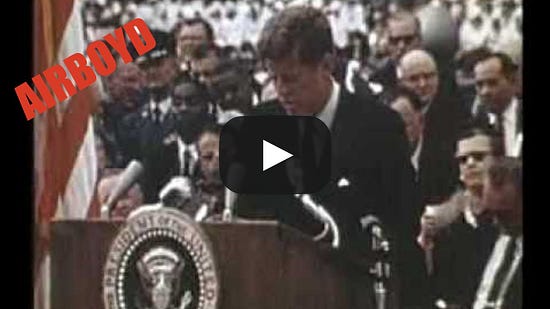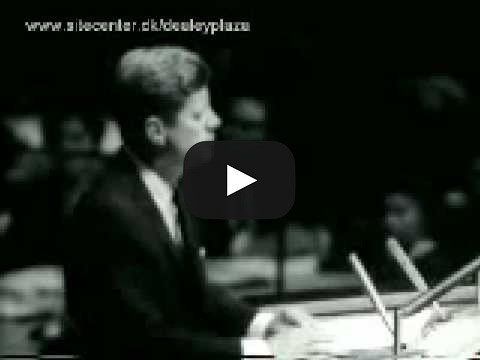By Matthew EhretSeptember 20th marks the anniversary of the last speech John F Kennedy delivered to the United Nations’ General Assembly. This event bears more relevance upon our present crisis than most people could possibly imagine. This is true not only because it is wise to pay homage to great ideas of the past which lesser souls allowed to slip away and get buried under the sands of time, but also because history provides many of the solutions to seemingly impossible problems in our own time. During his short speech, Kennedy outlined the very same fundamental obstacles to survival faced by our own world 58 years later: The spectre of nuclear annihilation looming overhead, poverty and the evils of colonialism staining humanity on earth, and the dominance of destructive modes of thinking which have prevented honest dialogue between the west and east who have so many common interests and yet have been blocked from acting upon them for want of creativity, understanding and faith. Although it is far too rarely displayed in history, great leaders (those who are beholden to their consciences) recognize that there are solutions to every problem. From Plato to Cicero to Confucius and Christ in ancient times or Thomas More, Benjamin Franklin, Lincoln, and Kennedy in our modern age, these rare but vitally important individuals demonstrate through their words and deeds that when the dominant social rules of the game prevent those necessary and possible solutions from manifesting, then only one course of action becomes possible: Change the rules of the game. The martyred Israeli Prime Minister Yitzhak Rabin eloquently touched on this truth in 1992 shaking the hands with Yasser Arafat and advancing a two-state solution saying: “The future belongs to those who have the courage to change their axioms.” Kennedy Breaks the Rules of the Great GameSuch was the case of John F. Kennedy who recognized early on in his short-lived presidency that the geopolitical “closed system” thinking dominant among the military and foreign policy experts of the west held only the seeds for humanity’s destruction. In his speech of September 20, 1963, Kennedy revisited a theme which he first unveiled on the day of his inaugural address in 1961: A joint U.S.-USSR space program to transform the rules of the Cold War and usher in a new creative age of reason, win-win cooperation and boundless discoveries. In his 1961 inaugural speech, Kennedy ushered in the theme that would animate his next three years saying:
Ten days later, Kennedy re-iterated this idea during his first state of the Union inviting Russia “to join with U.S. in developing… a new communication satellite program in preparation for probing the distant planets of Mars and Venus, probes which may someday unlock the deepest secrets of the universe”. Soviet Premier Nikita Khrushchev, and other leaders in the east heard these words with a mix of hope and trepidation. Leading Cold Warriors also heard these words… however hope was not among their feelings. Their hearts sank under the profound fear that the zero sum game theory models that they spent so much effort to bring online as substitutes for creative diplomacy would become obsolete in a new age of positive cooperation among sovereign nation states. These latter priests who were then led by such figures as the State Department’s Dean Rusk, Defense Secretary Robert McNamara, Joint Chiefs’ head Lyman Lemnitzer and the powerful Dulles brothers lit dangerous fires on multiple fronts in an effort to kill JFK’s vision in the cradle. The form this attempted murder took was the Bay of Pigs Invasion of April 17-19 which was put into motion weeks before the young president had stepped into the White House. Even though Kennedy outflanked the Dr. Strangeloves among the Joint Chiefs of Staff by not providing air support for the invasion, grave damage was done to U.S.-Soviet relations. When he finally met Khrushchev on June 4, 1961 in Geneva, the president’s offer for space cooperation was rejected by the Russian leader who demanded America commit to arms reduction and other acts of good will before any positive cooperation could possibly take place. Did Khrushchev recognize that Kennedy’s November 1961 firing of Allan Dulles and his threat to shatter the CIA into a thousand pieces demonstrated a potentially trustworthy partner during this period? We may never know for sure. Despite these setbacks, Kennedy’s requests for joint U.S.-Russian cooperation in space went on unabated and we do know that Khruschev’s letter congratulating the USA for putting their first man into orbit conveyed a strong reciprocal hope saying on February 21, 1962:
On September 12, 1962 Kennedy electrified the aspirations of both Americans and the world delivering his famous “Moon Speech” at Rice University saying:
 This speech and the accompanying top down federal spending needed to realize these goals ushered in a momentum and excitement which was nearly destroyed by the greatest nuclear confrontation humanity had ever faced only one month later as America and Russia nearly unleashed hell on earth during the 9 day Cuban Missile Crisis. Although it took an immense effort, JFK overcame immense opposition to negotiate the test ban treaty on August 5, 1963 co-signed by the USA, the USSR, UK and joined by over 100 other nations prohibiting nuclear test explosions in the atmosphere, underwater or in outer space. By that time, word was circulating among JFK’s closest staffers that the president was planning to visit Moscow either during his presidential campaign or in the earliest moments of his 2nd term in office. Never content to mechanistically focus on one policy at a time, Kennedy’s holistic approach to statecraft always opened multiple flanks simultaneously which was witnessed in his October 1963 efforts to pull America out of Vietnam with his NSAM 263, as well as his efforts to bypass the Federal Reserve by issuing Silver backed treasury notes to finance his growth policies both at home and abroad. The September 20 Offensive for CooperationThis brings U.S. to the decisive moment on September 20, 1963 as Kennedy gave his loudest impassionate call for a U.S.-Russian joint space program with the goal of putting a Russian and American on the Moon by the end of the decade. Kennedy opened his speech acknowledging the existential dark threat wrapped tightly over humanity saying:
Kennedy lays out the two opposing versions of peace (negative/deterrence vs positive/win-win) and clearly described which one was the only sustainable and legitimate form compatible with natural law:
The president poetically builds an understanding within his audiences’ mind to understand the possibility and necessity for positive peace conceptions that would require an end to Cold War thinking and usher in a new age of reason saying:
“All these and other new steps toward peaceful cooperation may be possible. Most of them will require on our part full consultation with our allies–for their interests are as much involved as our own, and we will not make an agreement at their expense. Most of them will require long and careful negotiation. And most of them will require a new approach to the cold war–a desire not to “bury” one’s adversary, but to compete in a host of peaceful arenas, in ideas, in production, and ultimately in service to all mankind.”  Did Khrushchev Respond?It is worth asking: how did he respond to Kennedy’s final call to cooperation? As far as this author can tell, history largely remained silent on this point for many years, until Sergei Khrushchev (Nikita’s son) delivered a revealing interview to Space Cast magazine on October 2, 1997.
Sergei also reported to Space Cast that like Kennedy, Khrushchev “was also planning to begin diverting weapons complex design bureaus into more consumer and commercial, non-military production.” Sergei ended his interview saying: “I think if Kennedy had lived, we would be living in a completely different world.” The Aftermath of Kennedy’s MurderKennedy’s murder on November 22, 1963 ended this potential and pulled humanity back into the iron grip of the Cold Warriors who sought to keep humanity’s creative potential locked under the heavy chains of nuclear terror, consumerist decadence (today called Globalization) and never-ending wars that wrecked havoc upon the next five decades. Under this closed system paradigm, creativity’s power to change our carrying capacity through scientific and technological progress was all but banned as vast financial resources were redirected away from NASA (whose budget peaked in 1965 and was only strangled continuously thereafter) into the military industrial complex and the growing debacle in Vietnam. This war which both Kennedy and his brother had fought to stop went far in annihilating the spirit of optimism in the hearts of the young and old alike while CIA-sponsored drugs flooded the campuses of America ensuring the growth of a new ethic of escapism, anti-humanism, post-truth modernism and rejection of Judeo-Christian traditions that infused western society its moral vitality for 2000 years. Humanity’s Second ChanceSecond chances of this magnitude do not come often, but sitting as we are once more upon the precipice of nuclear Armageddon (the Bulletin of Atomic Scientists has set the Doomsday clock mere seconds to midnight), the choice of global annihilation or survival has again been put before U.S.. Today, the spirit of JFK’s vision has come alive through the leadership of Russia and China who together have re-activated bold space missions to revisit the Moon with the full backing of the powers of sovereign nation states. This has manifested in the form of the Russian-China joint program to co-develop lunar missions, which have included the European Space Agency’s participation in the upcoming Luna 25, 26 and 27 missions to the Moon scheduled to occur between now and 2025. Roscosmos officials stated on August 27 that this program (which is open for the USA to participate in as an equal partner) “includes missions to study the Moon from orbit and surface, the collection and return of lunar soil to Earth, as well as in the future, the construction of a visited lunar base and full scale development of our satellite.” Roscosmos representatives went further to announce their plans to establish a permanent lunar base by 2030 with China following suite soon thereafter. China’s announcement to place human beings on Mars’ surface by 2033 and apply ion-propulsion rockets for space travel are game changing ambitions in this domain.  The spirit of JFK’s space vision has certain come alive in new and exciting ways, but one question still remains unanswered: Does America have the ability to withstand the forces seeking to dissolve the republic and join this new open system paradigm or are those forces which killed JFK and sunk humanity into an age of war and closed-system thinking too powerful to stop? The Rising Tide Foundation is a non-profit organization based in Montreal, Canada, focused on facilitating greater bridges between east and west while also providing a service that includes geopolitical analysis, research in the arts, philosophy, sciences and history. Consider supporting our work and making a donation today and subscribing to our page free of charge.
|
Thursday, July 25, 2024
Kennedy’s U.S.-Russia Joint Space Vision Must Be Revived
Subscribe to:
Post Comments (Atom)
Re: The life you're capable of living
January 13, 2026 | Read Online Re: The life you're capable of living Picture this for a moment: You wake up calm, not ru...

-
Greetings everyone ͏ ͏ ͏ ͏ ͏ ͏ ͏ ͏ ͏ ͏ ͏ ͏ ͏ ͏ ͏ ͏ ͏ ͏ ...
-
Rising Tide Foundation cross-posted a post from Matt Ehret's Insights Rising Tide Foundation Sep 25 · Rising Tide Foundation Come see M...
-
March 16 at 2pm Eastern Time ͏ ͏ ͏ ͏ ͏ ͏ ͏ ͏ ͏ ͏ ͏ ͏ ͏ ͏ ͏ ͏ ...
No comments:
Post a Comment